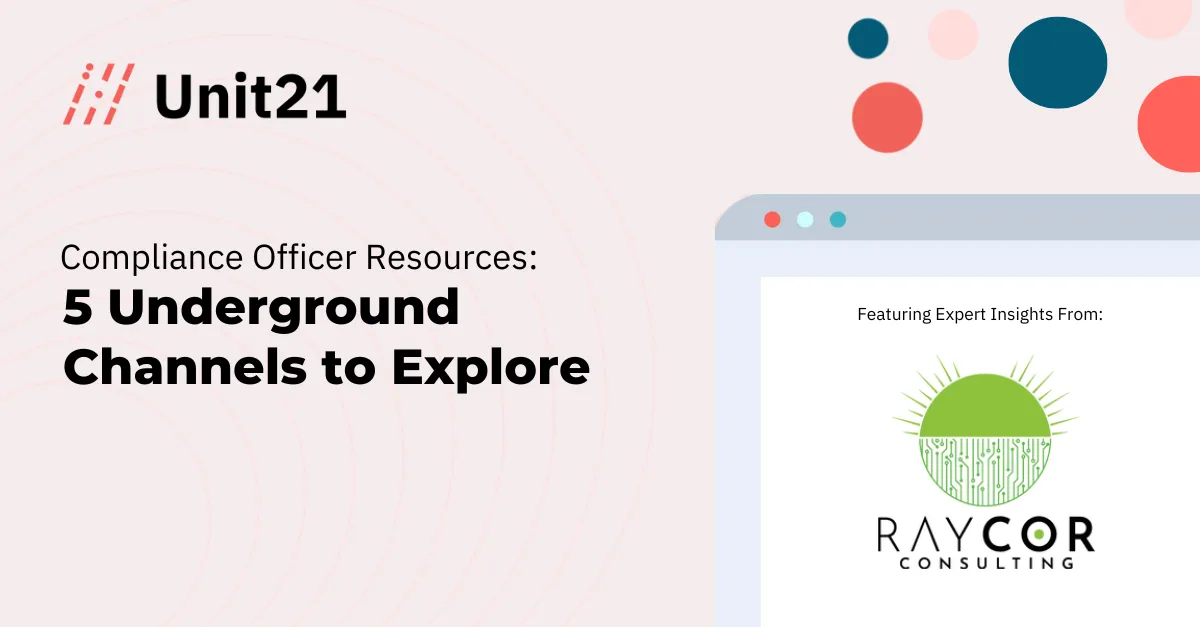

As a compliance professional in the digital age, regulations are constantly changing. And so too are the people, places, and mediums where valuable (and accurate) industry information can be gleaned.
Recently, Unit21 ran a survey to better understand how compliance professionals are finding and consuming educational information.
We asked a series of questions, including their role at the organization, their favorite channels and mediums for learning how to solve everyday problems, and the topics that are most important to them.
Of the 65 people surveyed, 21.54% of the responses came from individuals with AML/Compliance Analyst titles with the remainder holding various fraud risk & compliance titles.
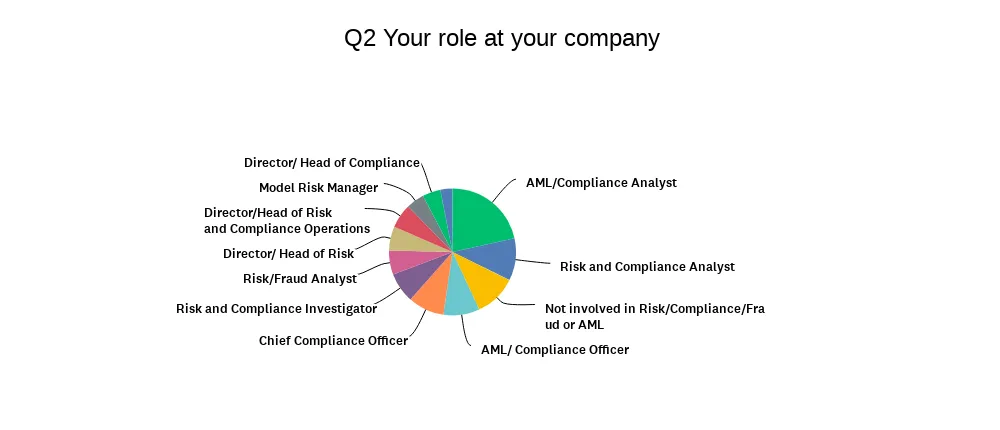
According to the survey responses, the vast majority of respondents (85.96%) prefer using search engines to discover and find content, with social media (63.16%) and industry newsletters (57.89%) coming in second and third.
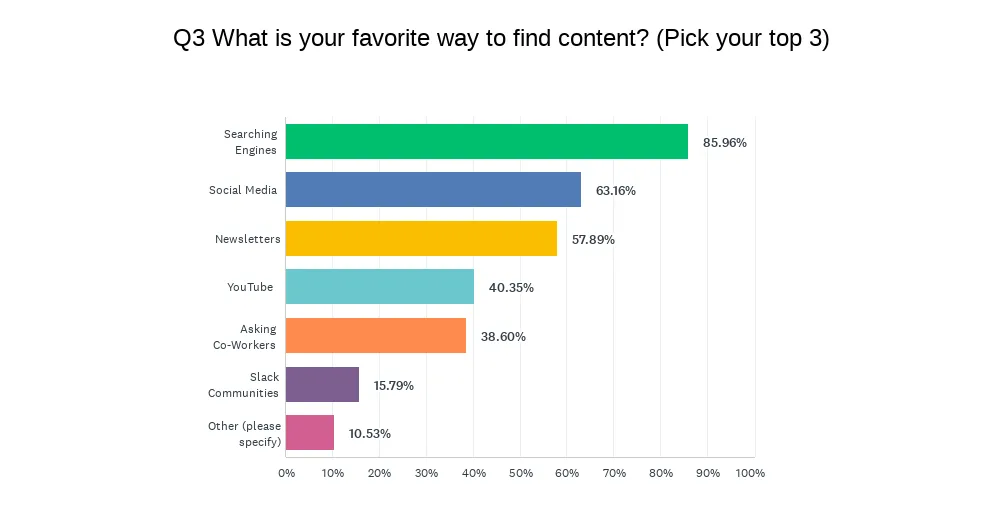
When asked about how they like to learn about the problem they are trying to solve, 70.18% responded that webinars were their favorite learning method, with reading blogs and industry newsletters trailing behind.
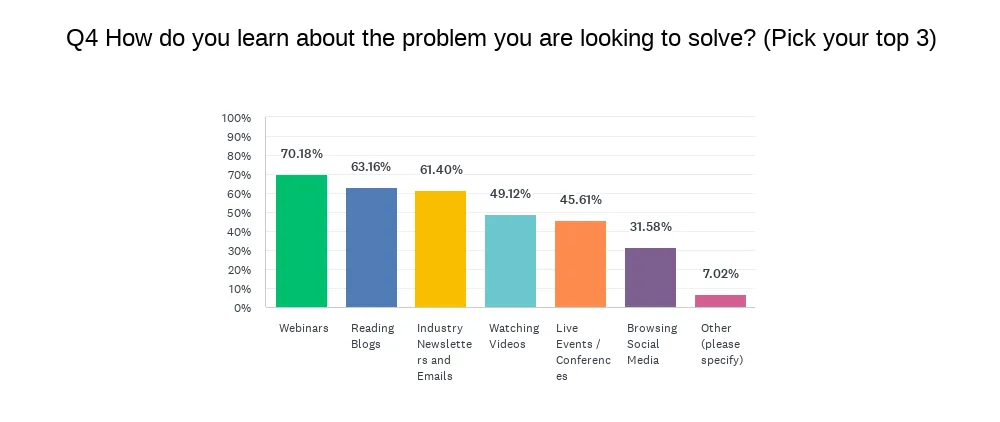
And finally, when asked about which topics were the most important to them, 73.68% of compliance professionals noted that content about Risk & Compliance Operations was the top priority.
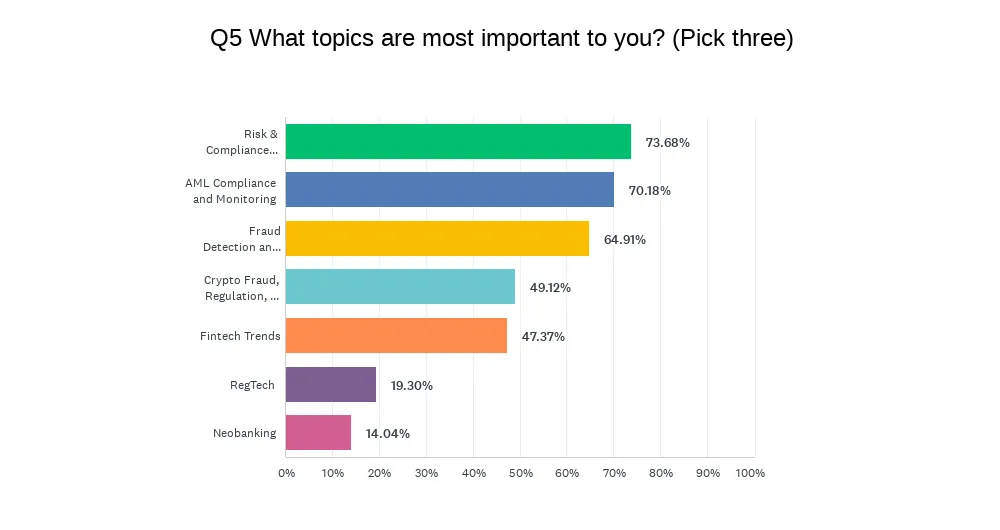
To expand further on our findings from the survey and to provide deeper insight into the complex web of information available to modern compliance professionals, this article will give you a non-traditional look at how today’s compliance professionals use different channels to stay ahead of the curve regarding compliance news, trends, and regulatory shifts across the financial services landscape.
The following observations come from Christina Rea & Matias Lefloth of RayCor Consulting, a firm that provides world-class strategic guidance, training, and advisory services that reconcile clients’ business growth models with compliance requirements and best practices.
Let’s dive in.
Social Media and the Compliance Landscape: An Overview
When compliance professionals have questions, they've always had a well-established stable of resources to turn to, chief among these being regulator and watchdog manuals and generic guidance providing checklists and basic definitions.
The advent of social media and new platforms for information exchange really take the age-old (age-old for those of us in compliance anyway!) questions such as “how do I practically interpret the regs, apply them to my company’s line of business, and operationalize them?” and provide dynamic new ways to find not only the answers you’re looking for, but also new ways of considering what compliance is and how it should be defined.
One of the most fascinating among these is the ability to receive and review opinions from multiple industry experts and leaders simultaneously, or even to reach out via social media and ask questions directly. No longer are we limited to just the opinions and input of our company's team members.
These days, instead of just thumbing through a dog-eared copy of the FFIEC manual or waiting for the weekly all-hands to discuss issues, compliance professionals can talk real-time with industry colleagues, open LinkedIn, and read posts by established thought leaders, listen to grassroots podcasts produced by industry experts, or even go “underground” to more traditionally taboo sources of reliable information such as Reddit, Twitter, and YouTube.
With this remarkable ability comes responsibility, however, as social media isn’t vetted and anyone can proffer expertise. Due diligence, something ingrained in all of us compliance professionals from Day 1 of our careers, should be carefully considered and conducted when utilizing alternative resources for information.
Traditional Resources for Compliance Professionals
In the “old days” of compliance (including the pre-Internet days but also the post-Internet days before there was an explosion of easily-accessible information on every platform imaginable), professionals were typically limited to regulator-generated resources, free guidance published online that always seemed more like a teaser to engage a consulting company than a practical how-to guide, and attending fireside chats and ongoing education events in person.
This isn’t to say that these resources aren’t still extremely valuable; they are and should be utilized as frequently as needed.
Examples of tried and true resources for compliance professionals include:
- The Federal Financial Institutions Examination Council (“FFIEC”) BSA/AML Exam Manual and Procedures,
- The Association of Certified Anti-Money Laundering Specialists (“ACAMS”) website, which includes certifications and links to webinars, trainings, and industry events,
- The Association of Certified Financial Crimes Specialists (“ACFCS”) website (similar to ACAMS, they also offer certifications, webinars, trainings, and industry events),
- The SEC/CFTC/IRS/FINRA/FinCEN/etc. official websites, which provide basic templates and information about how regulations are applied across various industries and the tenets each individual regulator expects its covered entities to abide by,
- Consulting companies (eg the Big 4 or other prominent advisory firms) guidance (typically found by perusing specific company websites or conducting Google searches on specific topics; these resources are usually limited in nature),
- The American Bankers Association (“ABA”) website, which provides articles, educational information, and schedules for webinars, and
This site straddles the line between traditional resources and alternative resources, as there are many official groups sponsored by regulators and law firms that provide guidance.
However, LinkedIn is a social media platform like many others and offers resources that, while not officially sanctioned by governing authorities, are provided by established industry experts and are peer-reviewed.
As such, this resource will also be covered under the “alternative resources” section of this article.
Alternative and “Underground” Resources for Compliance Professionals
(For the purposes of this post, alternative resources for compliance professionals refers to any platform providing information not issued or affiliated with a regulatory authority or governing agency/established watchdog, such as LinkedIn or grassroots podcasts/webinars/groups.
Underground resources refers to those platforms one layer below more well-known and oft-used resources like LinkedIn to sites not typically thought of as primary resources for legal and compliance professionals, such as Reddit, YouTube, and Twitter.)
As technology continues to develop at lightning speeds, so too does our need to have real-time answers to real-time compliance problems, such as fraud and blockchain transaction monitoring.
While the FFIEC manual and FinCEN site might be useful to help us figure out what types of companies would be considered a Money Services Business (MSB), or what types of red flags should be considered in a fulsome monitoring program for various types of business lines, they’re not going to give us answers on to how to prevent fraud before the ACH withdrawal is approved, or how to ensure data integrity is intact when stacking your company’s infrastructure with a new vendor tech platform.
To borrow the old cliche: for modern-day problems, we need modern-day solutions.
As mentioned above, one of the most popular among these is LinkedIn.
How Compliance Professionals Can Use LinkedIn
LinkedIn has long been used to connect with industry colleagues and those whose networks run in tandem with your own.
Anyone can post anything, and people often use the site to find jobs, join professional groups, and find answers to questions that traditional resources don’t provide.
However, LinkedIn has come a long way from just a place to announce your latest promotion. It has become, if not the birthplace, the unofficial headquarters of thought leadership amongst compliance professionals.
True industry experts, from regulators themselves to policy reporters to strategists and content creators at tech companies, are bringing a wealth of institutional and industry knowledge, as well as years of experience, to bear on nascent technologies.
They provide daily thought pieces on the latest regulations, tech, and industry trends, and everyone in this ecosystem can benefit greatly from their participation.
Anyone can follow their pages and be treated to not only the latest compliance news and trends but also thought-provoking considerations about how compliance is being redefined constantly and what it looks like in a post-pandemic world where nearly everything is (or can be made) virtual/digital.
Comments on these posts run the gamut from concurring and dissenting opinions to links and resources for further information and knowledge gathering. Networking and connection opportunities also abound, and these are great places to ask questions and also share knowledge.
LinkedIn has also become a heavily utilized resource for finding industry-specific groups, webinars, podcasts, and networking opportunities.
All of the traditional resources listed above have a LinkedIn page proffering more information about their organizations and links to sponsored webinars, but there are also grassroots groups popping up (not necessarily borne from LinkedIn but bolstered there to reach a wider audience) to promote everything from general compliance education to places to track the latest fraud and other financial crime trends to groups for specific subsets of financial service compliance, such as crypto compliance or Fintech compliance.
Examples of such resources include:
- In Fintech We Build Trust (a LinkedIn live show discussing compliance topics in the Fintech and Web3 space),
- The Association for Women in Cryptocurrency, and
- The Fintech Fincrime Exchange
These groups, and others like them, often offer virtual webinars and learning sessions, podcasts, and opportunities to network and ask questions/offer your own expertise with industry colleagues.
We’ve entered an era of socializing best practices in the compliance space, and there are more avenues for education than you can shake a stick at.
Regtech Vendors Are a Leading Source of Compliance Education
The proliferation of sponsored training, webinars, and certifications from well-regarded industry regulatory technology providers has dominated the alternative information scene in the past few years.
Specific among these are some of the blockchain analytics providers, such as TRM Labs, Elliptic, and Chainalysis. These names have become synonymous with thought leadership and the democratization of practical applications of compliance requirements.
They routinely offer virtual and in-person learning events and networking opportunities. These companies go beyond just discussing the colloquial pillars of AML or corresponding offshoots (eg, risk assessments and onboarding requirements) and get deeper into the black letter regulations and how they can be interpreted to shake up long-held notions of how to comply with the laws in such a way as to remain true to the spirit of the laws but to also allow for innovation and entrepreneurship in the industry.
Modern Compliance Professionals Rely on Twitter, Reddit, & Youtube
Last but not least there are what this author has dubbed “underground” alternative resources for compliance officers.
In a Gen Z world, with Generation Alpha hot at their heels, people are increasingly turning to their favorite social media outposts for information of all sorts.
A mid-level dive into these channels shows that, while still not frequently utilized for compliance research, there are tweets and subreddits, and youtube channels cropping up that mention compliance terms, promote compliance companies, and discuss what compliance principles apply in various use cases.
Examples include:
- Astra Protocol, a company advertising a desire to ensure financial compliance standards can be met in a Web3 industry and retweeting links to compliance and regulatory news sources,
- The Compliance Subreddit on Reddit, where questions run the gamut from SQL applications in AML to what to consider when setting up a compliance function at a cloud provider company, and
- Crypto Casey, a YouTube channel providing education and information on cryptocurrency and blockchain technology
Alternative Sources and Channels in a Nutshell
While these platforms are a less reliable source of information than the other traditional and alternative sources mentioned above, they can’t be discounted as a future source of information as their popularity grows.
“Meme stonks” taught us the folly of ignoring social media use in gauging investor priorities.
Finance industry influencers often take to social media (Elon Musk anyone?) to sway opinions on popular financial vehicles.
These underground compliance resources aren't mainstream, but they can provide utility by showcasing what those involved in the latest technologies are discussing if nothing else, as these conversations can lead to new schemes and scams that will necessitate more stringent regulatory regimes.
In addition, they can provide education on the newest technologies themselves, something compliance professionals have to keep on top of as they continue to analyze the ways in which regulations created for traditional financial institutions must be molded to apply to the newer payment applications.
Compliance Officer Resources: Final Thoughts
A compliance officer rarely ever has two days that are the same.
Every day there’s a breaking news article, a consent order, an arrest, new proposed legislation, new guidance, friction between compliance and the business and the engineering team, shifting priorities… we need all the help we can get!
This includes utilizing whatever resources are at our disposal, including alternative platforms, and connecting with our industry colleagues wherever possible for educational (and often moral!) support.
However, it is worth noting that using alternative resources, while beneficial, also comes with the price of personal discernment and verification.
A LinkedIn post by a well-known industry thought leader probably deserves more credibility than a subreddit purporting to offer answers on establishing a compliance program for a Fintech company.
Using a risk-based approach when considering alternative sources of information is a wise bet.
Think about:
- Who is offering the information?
- What are their credentials?
- Do they have an established web presence?
- Are they peer-reviewed?
- Do you need to conduct further research to find your answer?
Remaining open-minded to where you’ll find your answers is crucial these days, but remaining diligent is also critical when turning to social media platforms or industry influencers for help.
If you are interested in learning more about RayCor Consulting, please follow up with Christina and Matias on LinkedIn.
Subscribe to our Blog!
Please fill out the form below:
Learn more about Unit21
Unit21 is the leader in AI-powered fraud and AML, trusted by 200 customers across 90 countries, including Green Dot, Chime, and Sallie Mae. One unified platform brings detection, investigation, and decisioning together with intelligent automation, centralizing signals, eliminating busy work, and enabling faster responses to real risk.



